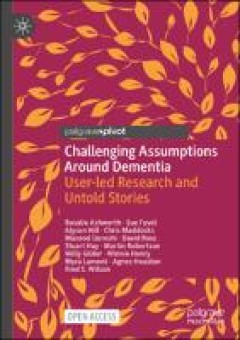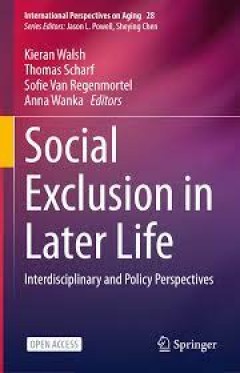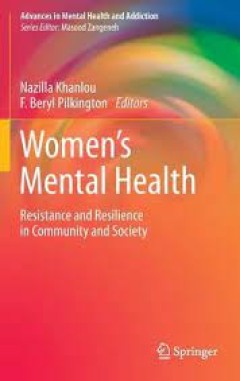Filter by

Health and Wellbeing in Late Life = Perspectives and Narratives from India
This open access book takes a multidisciplinary approach to provide a holistic understanding of late old age, and situates the aged person within the context of family, caregivers, clinical and other institutions. All through the book, the author discusses preparedness for an aging individual as well as the society in the Indian context. The book highlights inevitable but mostly neglected healt…
- Edition
- 1
- ISBN/ISSN
- 9789811389382
- Collation
- XXV, 195 ill; lamp
- Series Title
- -
- Call Number
- -

Challenging Assumptions Around Dementia: User-led Research and Untold Stories
This open access book explores the expectations surrounding dementia, what it ‘looks like’ and how people have been treated by others. It aims to raise awareness of the different types of dementia, and how they impact the brain, body, and lived experience, including experience of Alzheimer’s disease, Vascular Dementia, Posterior Cortical Atrophy, Frontotemporal Dementia, Semantic Dementia…
- Edition
- Ed. 1
- ISBN/ISSN
- 9783031272233, 9783031272226
- Collation
- 146
- Series Title
- -
- Call Number
- 611.8 CHA c

P5 eHealth: An Agenda for the Health Technologies of the Future
This open access volume focuses on the development of a P5 eHealth, or better, a methodological resource for developing the health technologies of the future, based on patients’ personal characteristics and needs as the fundamental guidelines for design. It provides practical guidelines and evidence based examples on how to design, implement, use and elevate new technologies for healthcare to…
- Edition
- 1
- ISBN/ISSN
- 9783030279943
- Collation
- XI, 189 hlm; ill., lamp.,
- Series Title
- -
- Call Number
- -

Violence and Mental Health Its Manifold Faces
Violence is one of the most important challenges, not only for public health systems, but also for public mental health. Violence can have immediate as well as long-term and even transgenerational effects on the mental health of its victims. This book provides a comprehensive and wide-ranging assessment of the mental health legacy left by violence. It addresses the issues as they affect states,…
- Edition
- -
- ISBN/ISSN
- 978-94-017-8999-8
- Collation
- -
- Series Title
- -
- Call Number
- -
Reasoning and Public Health: New Ways of Coping with Uncertainty
This book argues that in order to be truly effective, public health must embrace a group of reasoning strategies that have traditionally been characterized as informal fallacies. It will be demonstrated that these strategies can facilitate judgements about complex public health issues in contexts of uncertainty. The book explains how scientists and lay people routinely resort to the use of the…
- Edition
- 1
- ISBN/ISSN
- 978-3-319-15013-0
- Collation
- XIII, 242
- Series Title
- -
- Call Number
- 153

The Future of Health, Wellbeing and Physical Education
This book uses the example of a partnership journey between universities, schools, the local health industry as well as a number of government organisations which worked to ensure the growth of physical education in primary education. The initiative employed the United Nations (UN) ideals as a model and contextualised them within local schools and communities. What began as a pathway seed quick…
- Edition
- 1
- ISBN/ISSN
- 978-3-319-31667-3
- Collation
- XI, 174, 3 b/w illustrations, 3 illustrations in colour
- Series Title
- -
- Call Number
- -

Social Exclusion in Later Life Interdisciplinary and Policy Perspectives
Drawing on interdisciplinary, cross-national perspectives, this open access book contributes to the development of a coherent scientific discourse on social exclusion of older people. The book considers five domains of exclusion (services; economic; social relations; civic and socio-cultural; and community and spatial domains), with three chapters dedicated to analysing different dimensions of …
- Edition
- -
- ISBN/ISSN
- 9783030514068
- Collation
- -
- Series Title
- -
- Call Number
- -

New Directions in the Ethics of Assisted Suicide and Euthanasia
This book provides novel perspectives on the ethical justifiability of assisted dying. Seeking to go beyond traditional debates on topics such as the value of human life and questions surrounding intention and causation, this volume promises to shift the terrain of the ethical debates about assisted dying. It reconsiders the role of patient autonomy and paternalistic reasons as well as the part…
- Edition
- 1
- ISBN/ISSN
- 978-3-319-22049-9
- Collation
- IX, 252
- Series Title
- International Library of Ethics, Law, and the New Medicine
- Call Number
- -

Women's Mental Health Resistance and Resilience in Community and Society
This book focuses on the social and societal context of women's mental health. Drawing from multidisciplinary perspectives and scholarship, it pays particular attention to how women's mental health is experienced at the personal level, yet it is influenced by their relationships and interacts with the larger societal context (such as prevailing gender equality policies, income distribution, rol…
- Edition
- -
- ISBN/ISSN
- 978-3-319-17326-9
- Collation
- -
- Series Title
- -
- Call Number
- -

Violence and Mental Health Its Manifold Faces
Violence is one of the most important challenges, not only for public health systems, but also for public mental health. Violence can have immediate as well as long-term and even transgenerational effects on the mental health of its victims. This book provides a comprehensive and wide-ranging assessment of the mental health legacy left by violence. It addresses the issues as they affect states,…
- Edition
- -
- ISBN/ISSN
- 978-94-017-8999-8
- Collation
- XV, 423
- Series Title
- -
- Call Number
- -
 Computer Science, Information & General Works
Computer Science, Information & General Works  Philosophy & Psychology
Philosophy & Psychology  Religion
Religion  Social Sciences
Social Sciences  Language
Language  Pure Science
Pure Science  Applied Sciences
Applied Sciences  Art & Recreation
Art & Recreation  Literature
Literature  History & Geography
History & Geography